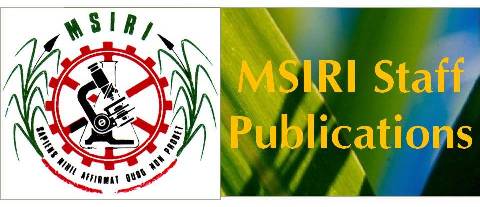Impact of invasive alien species on the wet forest of a tropical oceanic island
| MSI11P4579 | |
| Florens, F B V Baider, C Strasberg, D | |
| Impact of invasive alien species on the wet forest of a tropical oceanic island | |
| [Programme and Abstracts] - Adaptability to climate change and attaining the Millennium Development Goals for tropical ecosystems. The 2011 Joint International Meeting of the Association of Tropical Biology and Conservation and the Society for Conservation Biology (Africa Section), Narua Spring Hotel. Arusha, Tanzania, 12-16 June 2011 | |
| The 2011 Joint International Meeting of the Association of Tropical Biology and Conservation and the Society for Conservation Biology (Africa Section) "Adaptability to climate change and attaining the Millennium Development Goals for tropical ecosystems", Narua Spring Hotel. Arusha, Tanzania, 12-16 June 2011 | |
| book chapter | |
| 2011 | |
| p. 65 | |
| Abstract only | |
| En | |
| Given its high human population density and advanced state of habitat transformation, the volcanic island of Mauritius in the western Indian Ocean Islands Biodiversity Hotspot may be seen as what awaits many islands and regions around the tropics. In particular, alien species invasion, one of the main drivers of biodiversity loss, has reached extreme levels on the island. Tackling the problem posed by invasive alien species plays an important role towards reaching target 7B of the Millenium Development Goals. In Mauritius, several invaded native forest sites have been rid of invasive alien plants since 10 years or more. These provide a rare opportunity to investigate the impact that these alien plants may have had on the native tree community through measurement of the responses to the removal of the alien plants. Here we document the impact of alien invasions on the woody plant community of the wet native forests of Mauritius at the scales of individuals, populations and communities. We found that although these native forests are now dominated by alien species, they still contain a high diversity of woody plants. The main impacts of the control of invasive alien plants were an increase in native woody plant density. The eradication of invasive alien plants also improved survival and growth rate of many species and increased reproductive success of canopy trees. Some plant species hitherto taken as extinct =reappeared` within the areas weeded of alien plants and species that are Critically Threatened, as per the criteria of the International Union for the Conservation of Nature, recovered dramatically. We hope that the conservation success presented here will help managers who, in countries like Mauritius, still require encouragement to shift emphasis away from intensive species-centric conservation to the generally more all-encompassing and financially sustainable ecosystem approach to stem population declines and extinction. | |
| tropical island tropical oceanic island forests wet forests flora invasive plants invasive alien plants | |
| Mauritius | |
| Flora | |
| 2011-09-14 | |
| En | |
| LIB(pdf); HERB | |
| CAT | |
| HERB |
